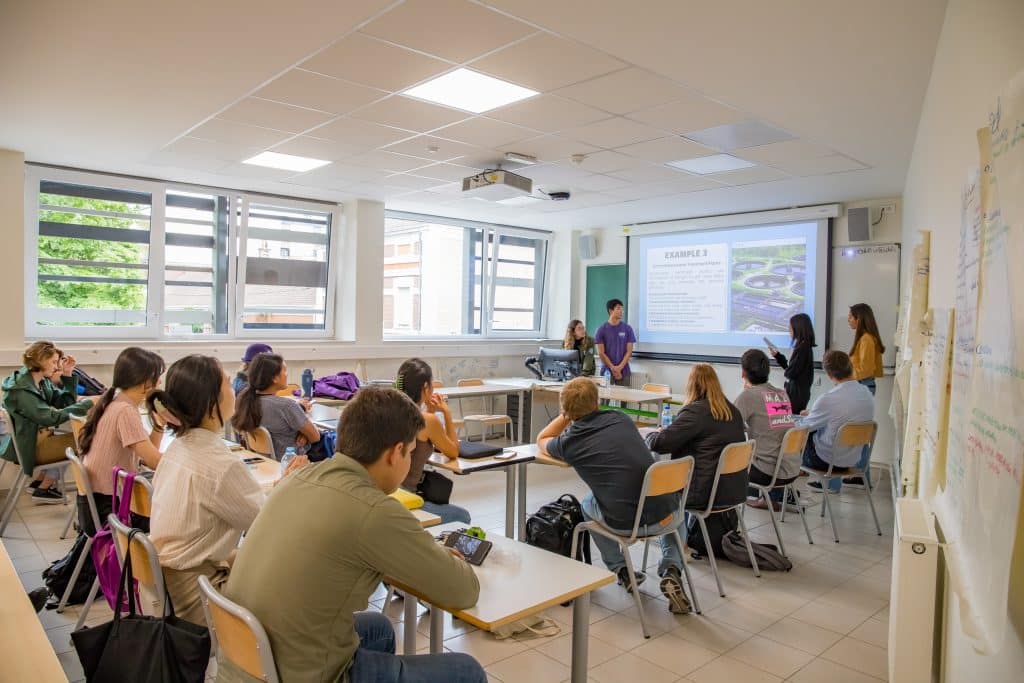Higher education system in France
In France, as in most countries in the European Union, the organization of post-secondary education is known as the “Licence, Master, Doctorat” system (Bachelor, Master and Doctorate), also called the LMD system.
This three-level system creates a common ground between countries and allows better recognition of the degrees obtained.
Degrees organization
Licence, Master and Doctorat degrees are obtained by completing a specific number of semesters. Each semester can award up to 30 ECTS (European Credits Transfer System) credits which can be transferred to other countries.
L (Licence or bachelor’s degree)
Completion of 6 semesters which is awarded by 180 ECTS credits
M (Master)
Completion of 4 additional semesters which award 120 ECTS credits.
There are 2 different types of Master’s degrees:
- Research Master: it includes a research work,
- Professional Master: it requires a work experience of 3-5 months according to the subject as well as an internship report.
D (Doctorate)
Completion of 16 semesters total which award a total of 480 ECTS credits. The Doctorat has to be completed in a minimum of eight years of studies.
ECTS credit system
The three-level system uses the ECTS system, enabling credits earned at one higher education institution to be applied towards a degree pursued at another institution.

Types of higher education institutions
In France, students can choose to study in three different types of institutions:
- Faculties, which offer degree courses in nearly all subjects,
- Vocational colleges and schools covering a wide range of courses which prepare students specifically for a particular career,
- “Grandes Écoles”, elite colleges which offer very high level specialised courses in subjects like business, politics or engineering.
The Université Catholique de Lille is unique in its combination of these 3 types of institutions.
Quality of the degrees and accreditations
The value of a French higher education diploma is guaranteed by the State. The degree is either certified by the French Ministry of Education (“diplôme visé”) or registered on the RNCP (French Directory of Professional Certifications).
For various “Grandes Écoles” and business/engineering schools, the quality of training and diplomas may also be certified by independent organisations issuing accreditations or labels.
Tips for successful studies
Organisation of the academic year
In France in general, and especially at Université Catholique de Lille, the academic year begins late August or September, depending on the institution and program. The year is separated in 2 semesters and is interrupted by holidays. The 2nd Semester starts in January and lasts until May or June. The summer holidays start after the second semester exams and retake exams may be suggested if a student fails any of the subjects.
Class formats
In French universities, instructors and researchers give students two types of classes:
– cours magistraux (lectures): a professor presents a subject to students in an amphitheatre. These classes are usually written up and handed out by the instructors to students in the form of pamphlets, which can help to revise for exams at the end of the semester.
– travaux dirigés (TD – tutorials) and travaux pratiques (TP – practical & lab work): these mandatory classes are held for smaller groups and with the intention of applying theoretical knowledge, and therefore aim to be more interactive. Additionally, company internships may be required to deepen the skills.
The Université Catholique de Lille is specifically committed to provide personalized support. Schools and faculties therefore aim to propose relatively smaller group sizes.
Are all classes in French ?
Although the major instruction language is French, there are more and more programmes in English. International students will have to present a certificate of proficiency in French to attend French courses.
The common reference is that of the Common European Framework of Reference for Languages.
Levels are rated from A1 (beginner) to C2 (proficiency). https://www.coe.int/en/web/common-european-framework-reference-languages/table-1-cefr-3.3-common-reference-levels-global-scale
Level B1 or B2 is recommended for studying at Bachelor’s and Master’s levels. Level B2 is required for admission to 1st year in the framework of the DAP (demande d’admission préalable). For specific programs, some French institutes of higher education can require a higher level (C1 or C2).
Taking exams
There are two ways that knowledge is tested in the French higher education system.
Ongoing assessment evaluates what has been learned throughout the year, with regular testing in each subject matter. There are exams given twice per year, at the end of each semester, for all subjects. Each subject will be assessed by a grade.


